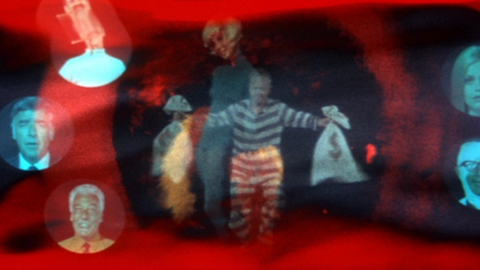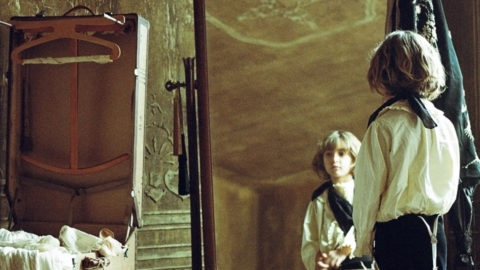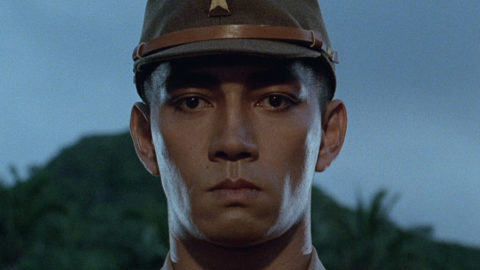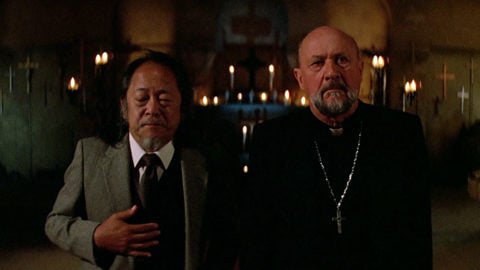Deep Cuts: Leonard Cohen
Some reading music: listen to this week’s special mix below. (See the full track listing.)
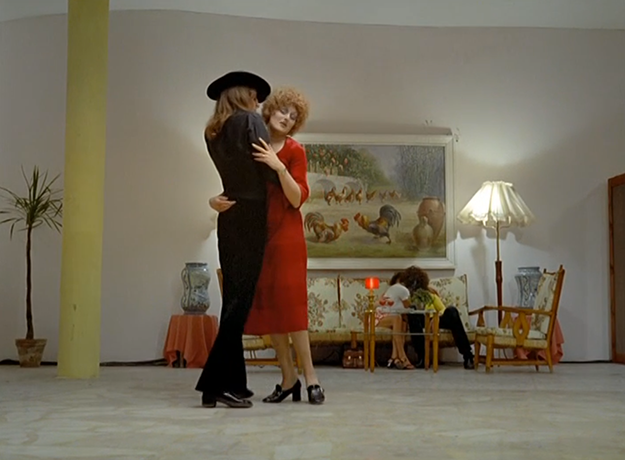
Beware of a Holy Whore
Spanning appearances of both the man and his music, the upcoming tribute to Leonard Cohen at Anthology Film Archives is short but sweet. “Darker: Celebrating Leonard Cohen” pairs McCabe and Mrs. Miller (1971), Beware of a Holy Whore (1971), and Donald Brittain’s documentary Ladies and Gentlemen . . . Mr. Leonard Cohen (1965) with two Canadian shorts, Derek May’s Angel (1966) and Josef Reeve’s Poen (1967). McCabe is the best known of the three features, and the strongest example of Cohen’s music put to film, with three songs interwoven seamlessly throughout. Beware of a Holy Whore, Fassbinder’s bitter ode to filmmaking, features six of Cohen’s songs and is indicative of the director’s career-long fascination with the poet. And for a privileged look at Cohen before he became a singer-songwriter, Ladies and Gentlemen accompanies the young poet as he returns home to Canada to promote his latest book.
In Ladies and Gentlemen Cohen is confident though self-deprecating, staying in a three-dollar-a-night hotel in Montreal. Shown luxuriating in a bath and prancing in his underwear for the camera, he has revisited his home country so that he can “renew his neurotic affiliations.” As the sober voice of a narrator intones off screen, “with the stoop of an aged crop-picker and the face of a curious little boy” Cohen walks through town, attending parties and conducting poetry readings in a leather blazer. He is persistently witty and oozes charm, and it’s a pleasure to watch Cohen at this stage in his life when his career path, as he described it, was “infinitely wide and without direction.”
A similar thought animates Josef Reeve’s experimental short Poen: “My mind seems to go out on a path the width of a thread and of endless length…” opens the prose poem excerpted from Cohen’s novel, Beautiful Losers (1966). Cohen begins to recite the poem four times, getting further into the text with each try. A rapid montage of black and white still images accompany his voiceover up until the fourth iteration of the poem, which includes archival footage of people shooting guns, war zones, and general destruction. Each image connects in some way to a line of the poem, an individual word or interpretation, and each series of images is different from the next. The camera zooms and pans penetratingly over the shifting images, creating a live collage that both augments and is augmented by Cohen’s multivalent poem.
In the second short, Derek May’s Angel, a young couple portrayed by Cohen and an uncredited woman scuffle in the snow and play with her floppy, polka-dotted fabric wings. The look of the film is extremely high-contrast with only pitch blacks and pure whites, distorting perspective and effectively creating a vast landscape of continuous snow. Bordering on twee, Angel features music written by Cohen and performed by The Stormy Clovers, Cohen’s early backing band. The instrumentals sound very much like that of Cohen’s debut album, Songs of Leonard Cohen, which was released the following year.
1971 was a big year for Cohen on film, beginning with the soundtrack for Altman’s McCabe and Mrs. Miller. An enthusiastic fan of Cohen’s first album, Songs of Leonard Cohen (1967), Altman pulled three songs and added them to McCabe during post-production. The soundtrack matched so perfectly with the images that many incorrectly assumed that Altman had the music in mind when he shot the film. Also released in 1971, Fassbinder’s Beware of a Holy Whore features six of Cohen’s songs playing on a jukebox in the lobby of a Spanish hotel where much of the film takes place. Switching routinely across several scenes from one song to the next, the soundtrack also includes music by Ray Charles, Elvis, and Spooky Tooth. As the jukebox shuffles impartially in the background, the repetitive murmur of Cohen’s flat croon works with the film, adding to its general claustrophobia. The music cycles throughout just as the characters cycle through different pairings and scenarios: fighting, kissing, drinking dozens of Cuba Libres and groping at each other. “Suzanne” first appears on the soundtrack as one of the characters relays his experience coming down from a “super high.” Fassbinder, playing the film’s high-strung producer, yells out impetuously over Cohen’s undulating baritone.
Looking beyond the films featured in Anthology’s series, Werner Herzog’s Fata Morgana, another product of 1971, applies three of Cohen’s songs to images of the Sahara desert. The action in the film appears to pause for “Suzanne” and “So Long Marianne” as the camera tracks fluidly from left to right. Footage of mirages, of the Sahara and its spare architecture pass by like a series of still images on a kinetoscope, with only the camera and Cohen’s music giving the sequence movement.
These movies were only part of a generally productive period for Cohen the musician, from 1967 to 1974. His debut album, Songs of Leonard Cohen, was followed by Songs from a Room (1969), Songs of Love and Hate (1971), and New Skin for the Old Ceremony (1974). Fassbinder continued to use his music throughout 1975, in the television production Like a Bird on a Wire, Fox and His Friends and Fear of Fear. His music experienced a bit of a hiatus from film for the next several years, though his recording and touring output continued, as evidenced by Harry Rasky’s 1980 concert film The Song of Leonard Cohen. Following a collaboration with oddball producer Phil Spector in 1977 (Death of a Ladies’ Man) and after releasing the more traditional Recent Songs in 1979, Cohen eased into another wave of popularity with Various Positions in 1984, which featured the delayed hit “Hallelujah,” destined to be covered by over 300 artists including Jeff Buckley. It was around this time that more European directors began to sample his music for television, including Jean-Luc Godard, who used Cohen’s song “The Guests” in Grandeur et décadence d’un petit commerce de cinéma, an episode of the television series Série Noire (1986). Cohen’s next album in 1988, I’m Your Man, remains one of his most popular while epitomizing the late ’80s sound, complete with heavy synthesizers and smooth sax.
The source of the success of I’m Your Man is the track “Everybody Knows,” which has enjoyed a prolific rotation in the years since its release. On film, Allan Moyle’s sardonic teen dramedy Pump Up the Volume (1990) makes memorable use of the song. Christian Slater stars as a horny ham radio host (alias: Happy Harry Hard-On) who plays the song several times on his radio show in between rants on freedom of speech, individuality, standing up to authority, etc. Cohen’s lyrics, among them “Everybody knows that the dice are loaded / Everybody knows that the good guys lost” speaks to Slater’s shy teenage angst (he’s the quiet kid at school) while feeding into his cocksure alter ego’s on-air anarchism.
In 1994, Atom Egoyan also featured “Everybody Knows” prominently in Exotica, a film about strip club and its motley band of customers and employees. Christina (Mia Kirshner), dressed in a baggy schoolgirl’s uniform, dances to the song twice, miming static gestures and wildly dipping her hips. In a film where characters struggle to connect amid unspoken trauma, “Everybody Knows” refers to things left unsaid and the feelings of hopelessness that many of the characters harbor.
In the decades since Exotica, countless films and television shows have sampled Cohen’s music, from Natural Born Killers (1994) to Shrek (2001) to The Young Pope (2017). In 2015, his song “Nevermind” became the opening credits theme for the much maligned second season of True Detective. Taken from his 2014 album Popular Problems, “Nevermind” began as a poem that was published in Book of Longing in 2006. Sung from the point of view of a criminal on the run, the song exemplifies the best of Cohen’s late music, accompanied by female backing singers over a pulsing beat, his voice rumbling at a low growl. The lyrics are appropriately rakish and creepy, telling of unmarked graves and a scofflaw with no name. No one has ever captured a mood quite like Cohen, and it is unlikely that anyone ever will.
Track List:
“Avalanche” Songs of Love and Hate
“Chelsea Hotel #2” New Skin for the Old Ceremony
“Lover Lover Lover” New Skin for the Old Ceremony
“Iodine” Death of a Ladies’ Man
“Everybody Knows” I’m Your Man
“Nevermind” Popular Problems
“You Want It Darker” You Want It Darker
“Hallelujah” Various Positions
“Waiting for the Miracle” The Future
“True Love Leaves No Traces” Death of a Ladies’ Man
“There is a War” New Skin for the Old Ceremony
“Bird on the Wire” Songs From a Room



